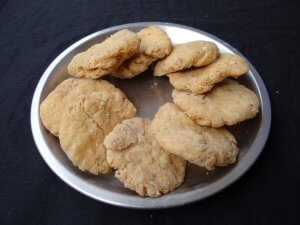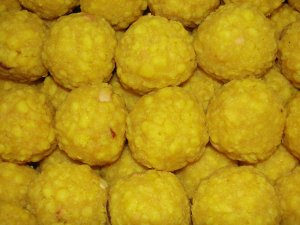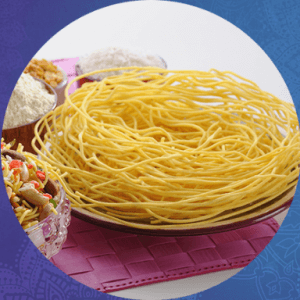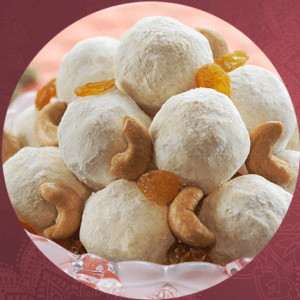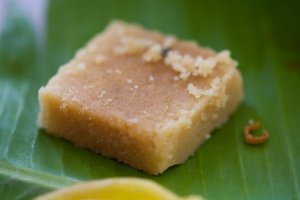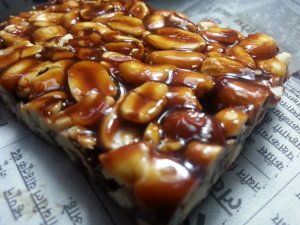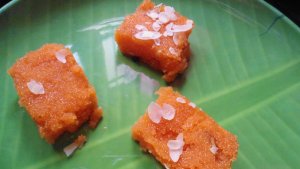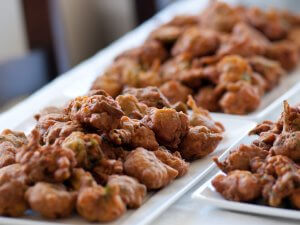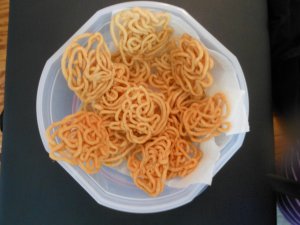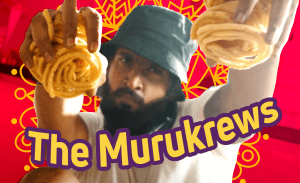Deepavali (or Diwali, if you’re feeling fancy) is coming and we’re sustaining ourselves with memories of the lights, the company…and of course all that great food!
But how much do you really know about your favourite festive goodies? Here’s how to identify some top picks, so you don’t malu-fy yourself in front of all the Indian aunties.
First Very Big Tip though: Not all the crunchy stuff is kacang putih. Don’t call it all kacang putih.
Later this uncle whack you. He whack very pain one.
Source: Mdsmds0, CC BY-SA 4.0, via Wikimedia Commons
This traditional North Indian flaky biscuit comes in sweet and savoury versions. The savoury version is usually fried with more spices for that added kick and crunch.
Source: Thamizhpparithi Maari, CC BY-SA 3.0, via Wikimedia Commons
Whether you call them ladu, ladoo, or laddoo, they’re still delicious. Everyone’s got a different fave variety and recipe, but they generally involve some mix of flour, fat and sugar.
Just don’t go around your Indian friends’ houses just to sample their ladoo and then bounce lah. That would be a real…la-don’t.
Source: BABAS
Omapodi is made from a dough of gram flour, rice flour and spices. You might know it as “that straight skinny murukku”, but calling it that might get you laughed straight out of the house.
Source: BABAS (yes, again)
Bet you can’t stop at just one! These sweet, spiced ghee balls may look simple, but their crumbly deliciousness will leave you wanting more.
Source: TimeOut
Also known as kacang putih, chevdo, chuda, or chanachur, Bombay mix has kept generations munching along. And if anyone complains you’re eating too much of it, point out the peanuts and peas count as nuts and vegetables.
Mmm, fudgey. Source: Charles Haynes, CC BY-SA 2.0, via Wikimedia Commons
Ghee, sugar, gram flour and cardamom are combined to make this delicious concoction. Depending on the amount of ghee in the recipe, mysore pak can be hard and porous or soft and dense.
Source: Sarangbombatkar, CC BY-SA 4.0, via Wikimedia Commons
This sweet is traditionally made with peanuts and jaggery – but there have been experiments with other sweeteners and nuts. Our unscientific conclusion: they’re all great.
Source: Babithajcosta, CC BY-SA 4.0, via Wikimedia Commons
Kesari gets its name from the word in multiple Indian languages for saffron, which gives it its golden hue. Recipes vary from region to region (and probably household to household), but it’s classically made with semolina/sugee, sugar, ghee, water and milk.
Source: Damien Ramon Naidoo, CC BY-SA 3.0, via Wikimedia Commons
Crunchy on the outside and chewy on the inside, these fritters are the cause of many roaring tummies within our team. And if anyone complains…they also have vegetables in them, so they can’t be all THAT bad, right? 😉
Source: Pazha.kandasamy, CC BY-SA 3.0, via Wikimedia Commons
What would we do without these crunchy, spicy, spiky/smooth spirals of deliciousness? The recipe traditionally contains rice flour, dal flour and salt, but we love our customisations (and spice) so you’ll see lots of additions: chickpea flour, sesame, chilli, dill, cumin…and we haven’t started on the moulds and the shapes yet, either! Every household probably has a recipe, even if it’s just the one on the back of Brand ABC Murukku Mix. It might look easy to make, but the reality is…a bit different. Especially if your Indian friends have all suddenly gone missing these past few weekends.
Check out our tribute to the Murukrews for the real story behind all that murukku, share a few laughs with your friends, and enjoy a great festival of lights this year!


